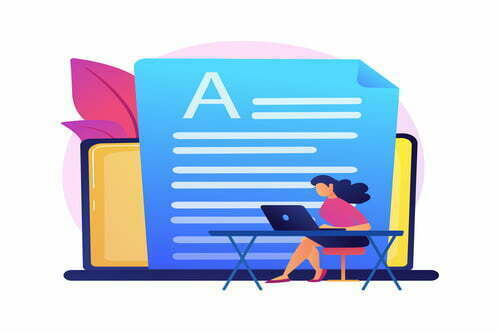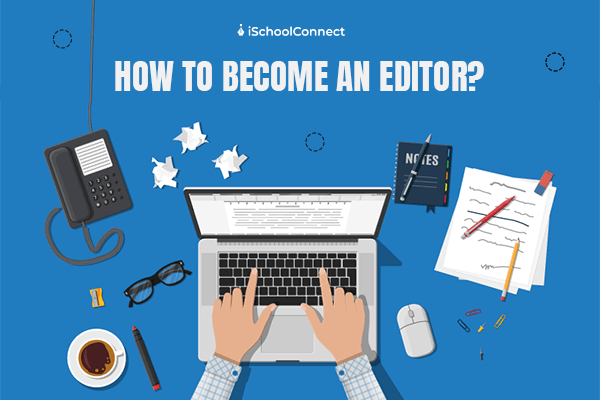Table of Contents
Introduction
A job as an editor might be perfect if you have a sense of creativity, a keen eye for precision, and a passion for language. Some editors can only work on a few topics at a time. More productive editors may edit in various topic areas, drawing on their uniqueness to understand the data and communicate with their audience. It’s up to the savvy editor to figure out what the author was trying to say and relay it to the appropriate audience.
Role of an editor
Editing and polishing writing, educating writers on guiding principles, and identifying ways to optimize the flow are just a few of the key responsibilities of an editor. Print magazines and the internet frequently employ editors, or a mixture of these. Editors develop relevant content and allocate stories to authors. However, their function varies depending on the firm and the sort of medium they deal with. They also proofread content, correcting spelling, punctuation, and grammar.
Qualifications required
A good editor’s most noticeable quality is its thoroughness. Editors must have a thorough knowledge of grammar. Editors must comprehend style in addition to grammar. It’s critical as an editor to work swiftly and meet tight deadlines. Writing skills along with interpretation skills of the given content of varying fields. Coordinating with the rest of the team is also an essential skill for an editor to master.

Top resources for an editor
Every editor should have a thesaurus on hand at all times. An up-to-date edition of a style guide is vital for copy editors. A calendar for scheduling, a journal for jotting down ideas, a dictionary, and a laptop or mobile phone with an active internet connection are essential tools for an editor.
Barriers to becoming an Editor
Employers often prefer individuals with either a bachelor’s in communications or English. Candidates with experience in newspapers, social media, and other media have better chances. Candidates with diverse backgrounds who can demonstrate good writing skills may also be considered editors. Editors who work on specific topic matters may be required to have prior job expertise in the field. Fashion editors, for example, may require fashion expertise gained through formal study or professional experience.

How much can an editor earn?
The expected total pay for an editor is 55k per year, with an average of 30k per year. The extra salary is anticipated to be 25k per year. Cash bonuses and commissions could all be options for further compensation. Further, freelancing as an editor can pay around 2L – 3L depending on your abilities and the amount of time you put in.
Is a degree required to work as an editor?
You’ll usually require some relevant qualifications in a flooded field with wannabe editors. These can take a variety of shapes. Nowadays, pursuing an editing job almost always necessitates a bachelor’s degree, particularly if you want to work for a publishing business. Although institutions are unlikely to provide degree programs dedicated solely to editing, Master’s degree courses in Publication and Creative Writing can help you understand the publishing process and the writing craft. You can still take short-term courses in editorial work, reporting, or publication after completing your undergraduate education.
How to become an Editor?
Select the editing method you want to use. Editing for books, newspapers, magazines, or academic purposes like web editing or technical editing. Obtain a degree or a certificate in editing. Bachelor’s degree is required. Short-term postgraduate degree programs in journalism reporting or publication are available. Apply for internships in publishing and small freelance jobs. Look for senior editing positions. Create a powerful editorial network.
What qualities distinguish an excellent editor?
Paying meticulous attention to every book’s detail sets highly compensated editors apart from others. An editor’s great eye for detail enables them to discover inconsistencies and inaccurate material swiftly. Even though editing is challenging, professionals pay great attention to the material to convey it as accurately as possible. Editors operate in a wide range of businesses and perform various tasks. However, no matter the project, the ultimate goal will always be the same: to increase communication quality.

Career prospect
Most people choose to work as professional editors since they are fascinated by language. They enjoy finding the perfect word to express a message, deciphering a complex piece of data, and rewriting language until it flows seamlessly. In addition, editors are enthusiastic about accuracy and precision. Moreover, editing attracts them since they cannot overlook the errors that they see in publications. They can detect incorrect reasoning, figures, and poorly written words. An interest in language isn’t necessary for a career as an editor, but it is good to have. Great editors combine their enthusiasm and ability to earn a living and give back to society.
Key takeaways
- An editor manages a client’s, company’s, or organization’s content needs.
- Their main responsibility is to deliver compelling textual and visual material to a specific audience.
- Editors work in a wide range of businesses.
- Creating, generating, editing, and analyzing content are all part of this process.
We hope you enjoyed reading this blog. In case of any queries, reach out to us or drop a comment below!
Liked this blog? Read next: Insights on Content Marketing | Humans of iSchoolConnect!
FAQs
Q1. Is it compulsory to be a professional in English?
Answer- An interest in the English language isn’t necessary for a career as an editor, but it is good to have. Great editors combine their enthusiasm and ability to earn a living and give back to society.
Q2. What is the work of a book editor?
Answer- Suppose a document is in the shape of an essay, a novel manuscript, a blog, research, a press report, or another method of interaction. In that case, the editor is responsible for making sure it is error-free. Book editors that are well compensated, appreciate the value of time and approach.
Q3. What other jobs can editors do?
Answer- In addition to being content editors, there is a variety of job titles, such as fact-checker, content editor, writer, content specialist, proofreader, editorial assistant, and copy editor. Whether editing print or online content, editors of all types help make content clear, logical, and organized.







